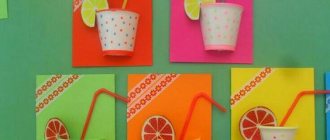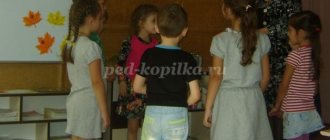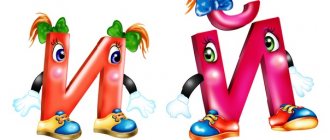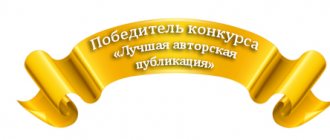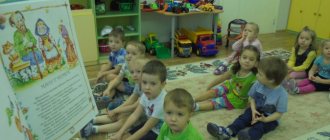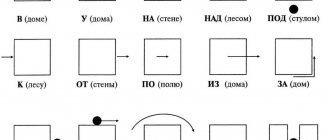Game lesson on speech development on the topic “Dishes”
- February 20, 2013
Competition “My Pedagogical Initiative - 2012”
Nomination “Methodological work in preschool educational institutions”
In various game situations during speech therapy classes, children acquire correct speech skills. During preliminary work, children acquire sufficient experience in orientation on this topic.
Therefore, I conduct final classes in each period of speech therapy work as a festive event. It is not entertaining, but educational. This is a kind of result, a generalization of all acquired knowledge, skills and abilities. After all, the child most fully and clearly perceives and remembers what affected him most emotionally, what was interesting to him.
Unlike ordinary children's parties, where, as a rule, the most lively and capable people are occupied, all children participate here. To gain confidence in their own knowledge, children are given the opportunity to show themselves and others their awareness of a given topic.
Preparation for the final lesson takes 3–4 days. Accompanied by thematic conversations, didactic speech games, display of visual material, reading fiction: poems, fairy tales, short stories, riddles; I teach in advance how to compose descriptive stories about any piece of utensils according to a diagram.
The lesson is structured in the form of a problem situation, in the form of a “provocative” dialogue with children, which allows preschoolers to think about the properties and quality of the materials from which the dishes are made, to better understand the topic, broaden their horizons, and enrich their vocabulary.
The effectiveness of this lesson is quite high due to the fact that the basic knowledge of preschoolers on the topic “Utensils” finds its application in it. Children clearly feel the value of the skills they have accumulated and apply them in practice (in conversation, didactic games, art activities, etc.).
The presented summary traces the interdisciplinary connection of classes in “The world around us”, “Speech development”, “Mathematics”, “Art activities”, “Music”. Individual handout cards with tasks that develop logic and children's thinking are original, made specifically for this lesson and have not been used or used anywhere before.
It is recommended that the lesson be conducted in a fun, emotional, and playful manner, evoking positive emotions in children from the correct answers they give. Everything should contribute to a joyful and upbeat mood in children and their free speech communication.
Program content
Goals:
- Continue to instill interest in the life of the Russian village.
- To consolidate children's knowledge about modern and ancient dishes.
- To consolidate knowledge about different types of utensils and their purposes.
- Expand children's active and passive vocabulary.
- Formation of lexical-grammatical structure and coherent speech.
- Develop perception, attention, memory, thinking, imagination and
- emotional-volitional processes.
- Develop graphic skills.
- Cultivate a caring attitude towards dishes.
Tasks:
- activate the dictionary on the topic “Dishes”, a dictionary of synonyms, encourage them to practice word formation.
- improve the grammatical structure of speech, the ability to coordinate adjectives in gender, number, and case.
- activate mental activity, learn to solve riddles and resolve problem situations.
- consolidate the ability to write descriptive stories about dishes.
Techniques of cognitive and speech development:
- verbal technique: conversation, question - answer;
- solving a problem situation;
- didactic games: “Add the required piece of utensils to each group”, “Find the pattern”, “Count and name”, “Color the outline of the samovar”;
- visual technique.
Vocabulary work:
- Active vocabulary: cast iron, samovar, grip, iron, wood, glass, shiny, transparent.
- Passive vocabulary: painted, porcelain, plastic, clay.
Preliminary work:
- Reading the work of K. Chukovsky “Fedorino’s grief.”
- Games on the theme “Dishes”;
- Musical game “Bai-kachi-kachi-kachi”.
- Introducing children to the properties of wood, glass, iron, clay, cast iron.
- Training in writing descriptive stories about any item of utensils according to a diagram.
Equipment:
- suit for Fedora,
- samovar,
- cast iron,
- pot,
- iron and wooden spoons,
- any aesthetically made dishes,
- individual tasks (cards),
- visual aids (photos of samovars),
- outlines of samovars, paints, pencils.
Appendix 1: Speech therapy lesson notes.
Author: Tatyana Aleksandrovna Zykina, teacher-speech therapist at MBDOU No. 312 “Katyusha”, Rostov-on-Don. Work experience in the specialty is 10 years.
Summary of a speech therapy lesson on the lexical topic “Utensils”
Summary of a speech therapy lesson on the lexical topic “Utensils”
Prepared by: Elena Yuryevna Davydova Teacher - speech therapist Municipal budgetary preschool educational institution
kindergarten "Alenka", r.p. Dmitrievka Nikiforovsky district, Tambov region
Correctional educational goals: Clarify and expand the understanding of utensils and their purpose; Reinforce the concepts of tea, table, kitchen utensils. Clarify and activate vocabulary on the topic. Develop coherent speech, learn to write descriptive stories. Improve the grammatical structure of speech, develop a verbal dictionary, learn to select antonyms, improve the skills of syllabic analysis of words.
Correctional and developmental goals: Development of visual attention and perception, speech hearing and phonemic perception, memory, fine and gross motor skills, coordination of speech with movement. Development of articulatory motor skills.
Correctional and educational goals: Formation of skills of cooperation, mutual understanding, goodwill, independence, initiative, responsibility.
Equipment: typesetting canvas, pictures of dishes, a ball, a diagram for writing a descriptive story
.
Speech therapist: To find out what we will talk about today, complete my assignment. Place your hand in the bag, feel for one object, feel it and say what it is, how did you guess about it. Children take turns putting the objects into the bag, feeling the objects and talking about how they recognized them, and then taking them out of the bag and putting them on the table. 1st child: I found the kettle. It's round. It has a spout and a handle. (Etc.) Speech therapist: Well done. You all guessed the items and told them well. Now think about how to name these objects in one word. Children: Dishes. Speech therapist: Correct. Do you know what utensils are for? Children: They prepare and store food in dishes, and eat from dishes. Speech therapist: You probably already guessed what we will talk about today, of course, about dishes.
2. Game “One-Many” Cup – cups Saucer – Plate – Glass – Glass – Teapot – Mug – Frying pan – Salt shaker – Candy bowl –
3. Exercise “In the Store” - Guys, now we will play the game “Shop”. Today a new product was brought to the store, and the sellers did not have time to sort it out. Let's help put the dishes on the shelves. You need to put teaware on the top shelf, kitchenware on the second shelf, and tableware on the bottom shelf. The speech therapist calls willing children and helps if necessary. The rest of the children evaluate whether the task was completed correctly. Teapot, cup, saucer, sugar bowl. —What are tea utensils for? — When do you use tableware and why is it called that? - Right. Where are kitchen utensils used? What is it for? - Well done, you did the job well. Now let's play with our fingers.
4. Physical school One, two, three, four, five Let's help mom We quickly washed the cups We didn't forget about the plates We put away all the dishes We were very tired Children walking Clap their hands Circular movements with their palms Circular movements with their palms Spread their arms to the sides
5. Writing a descriptive story about dishes I invite you to be real writers and come up with a story about any item of dishes. To make it easier to describe the item, look at the hint diagram. What is this? What colour? What size? What material is it made of? Which one is it intended for? This is a teapot. It's big, metallic, red. It has a lid, a spout, and a handle. A kettle is a kitchen utensil. Water is boiled in it.
6. Articulation exercises - You have composed interesting stories, let your heads rest and work your facial muscles. - Let's imagine that we were treated to carrots. It's sweet and firm. We'll show you how we'll chew it. “In the village, grandma doesn’t have a kettle, but she has a pot-bellied, important samovar.” Let's puff up both cheeks at the same time. — The samovar has boiled and it’s time to put the cups on the table. Let's do the "Cup" exercise. - Well done! All exercises were performed well.
7. Exercise “What to do?” The speech therapist invites the children to choose one picture of dishes and take it for themselves. - Look at the pictures that you have chosen and tell us what this dish is for and what you can do with it. Select as many words as possible that answer the question “What to do?” You can fry it in a frying pan. It can be washed and cleaned. Pour it with a ladle. It can be washed. You can pour soup into a plate and eat from it. It can be washed and wiped.
8. Game “Broken Cups”. The speech therapist invites the children to go to the tables and help him glue the cups that accidentally broke. Speech therapist: Please help me glue the cups that accidentally broke. They look like these cups in the picture. Children complete the task. The speech therapist provides assistance to them if necessary. Then the children collect the pieces into envelopes.
9. Game “Fourth wheel” - Well done. Next task for attention. I will name the words, and you must say which word is superfluous and why. Glass, table, plate, spoon. Spoon, fork, cup, knife. Pot, frying pan, cup, ladle.
10. Game “Say the other way around” (with a ball) - Now we will play the game “Say the other way around” with the ball. I throw the ball and say the word, and you say the opposite.
The spoon is clean - the spoon is dirty. A deep plate - a shallow plate. Big cup - small cup. The frying pan is heavy - the frying pan is light. Old knife - new knife.
11. Summary of the lesson (evaluation of children’s work) The speech therapist suggests recalling all the tasks they performed and telling them what was interesting to them. Then he evaluates the children's work.
